Is it time to upgrade your company’s learning platform? These five Docebo alternatives are worth considering. Over 40% of Fortune 500 companies use a learning management system (LMS) to train employees. And these figures are only set to increase as more platforms hit the market. This is great news if you’re looking to upgrade your current tool.
Whether or not you use it, you’ve probably come across Docebo. It’s a well-known training software with many standout features, making it popular among large enterprises. But despite these great features, it may not be the best fit for your business needs and future goals. If you have outgrown Docebo, here are some remarkable alternatives you can try instead.
| LMS | Type of solution | Key features |
|---|---|---|
| Docebo | This AI-powered LMS has all of the essential features you would want in an online platform, and provides a content marketplace. | – Social learning features – Extended enterprise – Content marketplace – Basic course builder – e-Commerce |
| Talent LMS | This learning software provides rich configuration capabilities, a great range of integrations, and a well-stocked library of courses. | – Discussion forums – e-Commerce – Basic course builder – Extensive integration capabilities – Ready-made content |
| iSpring Learn LMS | An easy-to-use platform that offers extensive authoring capabilities, integration with Zoom, and an excellent user experience for both admin and learners. | – Integration with award-winning authoring tool – Mobile app with offline learning – World-class 24/7 tech support – Intuitive interface – Custom reporting |
| Absorb LMS | An online learning platform with robust security features, extensive integrations, and an easy-to-use interface. | – Absorb Amplify content library – e-Commerce – Absorb Infuse LXP – Custom reporting – e-Signature learner verification |
| Litmos LMS | This platform provides rich customization features and a comprehensive library of pre-packaged content. | – Litmos Heroes content library – Social learning – Content authoring tools – Great integration capabilities – e-Commerce |
Docebo – A Quick Look
Docebo is a full-featured, cloud-based eLearning platform for providing online learning at scale. It comes with plenty of functionalities to help businesses manage training activities, including all the standard features you would expect an LMS to provide. Additionally, it’s simple to use and has a relatively straightforward setup process. Pricing starts at $230 per license.
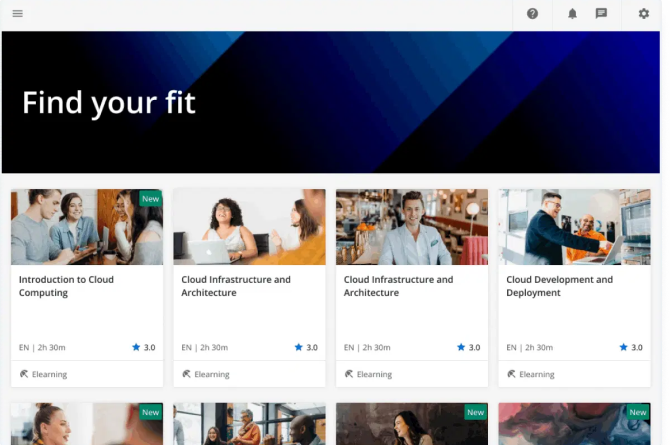
Key features
- Basic authoring capabilities
- Gamification
- Advanced Reporting
- Mobile app
- Extended enterprise
- Docebo Pages (website customization tool)
- Content marketplace
- AI-powered engine
My verdict
Docebo definitely has some high-end features. The AI engine, Docebo pages, and the sleek mobile app are particularly noteworthy, as is the Docebo Mobile App Publisher, which allows you to build your own mobile app.
There are also a few drawbacks, however. While Docebo does offer a flexible pricing model, it’s still a big investment — especially since some of Docebo’s competitors have similar offerings with a much smaller price tag. Moreover, some organizations may find Docebo’s customization and integration options limited compared to other platforms. Here are some comparisons for your consideration.
Docebo vs. TalentLMS
TalentLMS is a cloud-based eLearning system with excellent customization options. It offers all the fundamental LMS features and some interesting tools aimed at boosting learner engagement.
In terms of setup and configuration, TalentLMS nails it. You can get up and running right away, and the interface is extremely user-friendly. Pricing starts at $69 per month.
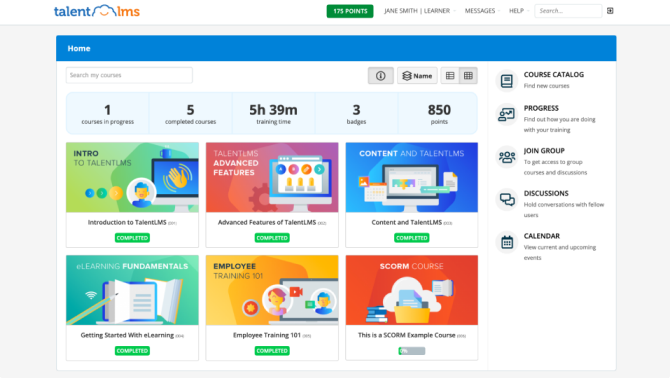
Key features
- Basic course-building tool
- Discussion forums
- Off-the-shelf content marketplace
- E-commerce capabilities
- Custom reporting
- Extensive list of integrations
- Mobile app
- Domain mapping
My verdict
I think TalentLMS is one of the best Docebo alternatives if you’re looking for a platform with more advanced customization options. It has similar features in terms of e-commerce, basic authoring capabilities, social learning tools, and a content marketplace. But it outshines Docebo when it comes to configuration options. I especially like the flexibility in the number of user profiles and the extensive list of integrations.
However, if you’re looking for a solution to create in-house training materials, there are other more suitable options on this list. The pricing may also be a turnoff for some companies, especially since some features like custom reporting are only available with higher-priced plans.
Docebo vs. iSpring Learn
iSpring Learn is a straightforward yet powerful cloud-based LMS solution with a fair pricing model. The platform offers all the must-have features you’ll need, such as custom user management, gamification, personalized learning paths, and integrations with corporate tools. It also has an integrated content authoring tool that allows you to build professional-grade eLearning materials in-house.
What sets iSpring apart is the high-quality, 24/7 customer support and overall user experience. The setup is quick and easy, so you can begin creating and deploying online courses within minutes. Reporting is smooth and effortless, making it easy to measure training ROI. Moreover, learners can download their training courses on their devices and study offline without losing their progress. The starting price is $2.28 per user per month.
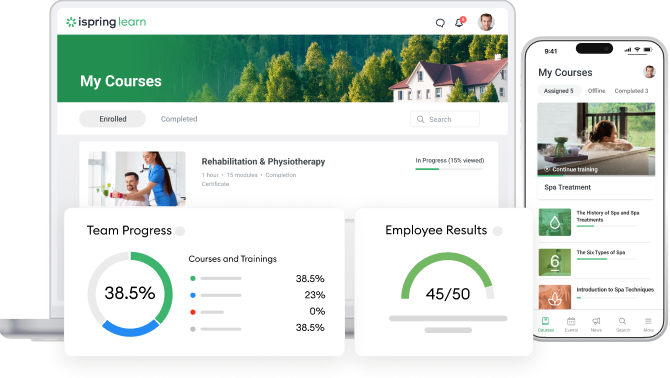
Key features
- Award-winning integrated content authoring tool with a fully stocked character library
- Compliance certification
- Advanced reach reporting
- Native mobile app (with offline learning capabilities)
- 360-degree performance appraisal tool
- Built-in corporate newsfeed
- Supervisor dashboards
- Extended enterprise
My verdict
iSpring Learn is an outstanding alternative to Docebo if you’re looking for a tool with superior content authoring capabilities. It features an easy content creation tool and updates right on the platform in a lightweight format of long reads with multimedia and quizzes. This could be a clincher if your business plans to create in-house training materials in the future.
Similar to Docebo, it offers a beautiful mobile app with offline learning support. That said, iSpring beats Docebo when it comes to customer support, user-friendliness, and pricing models. It also has a noteworthy range of tools to drive employee engagement (I especially like the 360-degree performance review tool). Fair warning, though: iSpring Learn may not be the best solution for companies looking to sell online courses.
Docebo vs. Absorb LMS
Absorb LMS is a user-friendly platform that caters to a range of training needs. It has a built-in content library and integrates with several external content libraries, such as LinkedIn Learning. In terms of setup and configuration, Absorb LMS performs well. It’s quick to get it up and running and offers support throughout the process.
There are two features that I’d like to highlight. The first is the robust security options it offers. Absorb has the highest LMS compliance standards for GDPR, as well as SOC 2 Type 2 compliance. This could be a clincher for organizations in heavily regulated industries. I also really like the Availability Rules, which allow admins to quickly filter access to specific projects and tailor how content is presented to different learner groups.
There’s an initial setup fee of $3,200 (which includes support and training) plus the licensing fee, which starts at $800 per month. You’ll also pay an annual fee of $16 per active user.
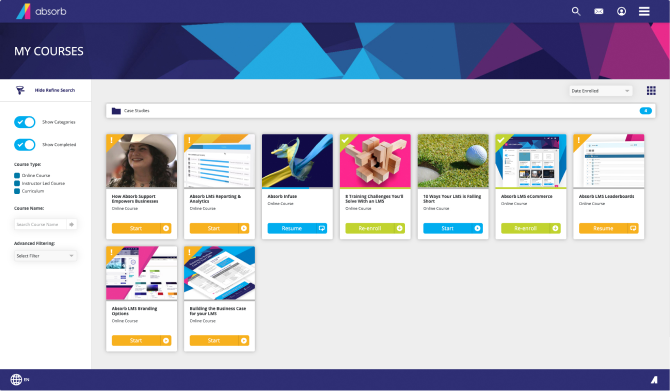
Key features
- Custom reporting
- Basic authoring capabilities
- Gamification
- Stringent security features
- E-commerce capabilities
- Absorb Infuse learning experience platform (LXP)
- E-signature learner verification
- Absorb Amplify content library
My verdict
Absorb is another one of those Docebo competitors that has a lot to offer. The e-signature learner verification tool is a nice touch and great for compliance training. Similarly, it boasts stringent security features, making it a great contender for organizations with strict compliance regulations.
Absorb LMS falls short on content authoring capabilities, however. While you can create basic courses, you’ll most likely have to fork out for a separate tool if you plan to build in-company content. And considering the already hefty price tag (and setup fee), this may not be an option for most organizations. Speaking of pricing, the annual per-user fee could lead to some nasty hidden costs if not properly managed.
Docebo vs. Litmos LMS
Litmos is another one of our most popular Docebo alternatives, and for good reason. It’s a cloud-based platform that covers all your essential LMS needs. For instance, it offers tools for gamification, certificate management, in-depth reporting, and external training.
Litmos shines in two main aspects. The first is that its content library is packed with great off-the-shelf learning content on a range of relevant topics. This is a great plus for companies that don’t currently have a lot of internal training materials to share. The second is its multitenancy functionality, which allows organizations to use the same LMS while isolating their data, configurations, and access permissions. I see this as a valuable tool for businesses with subsidiaries, franchises, or government bodies. The Litmos Pro subscription starts at $5 per user per month, with a minimum of 150 active users.
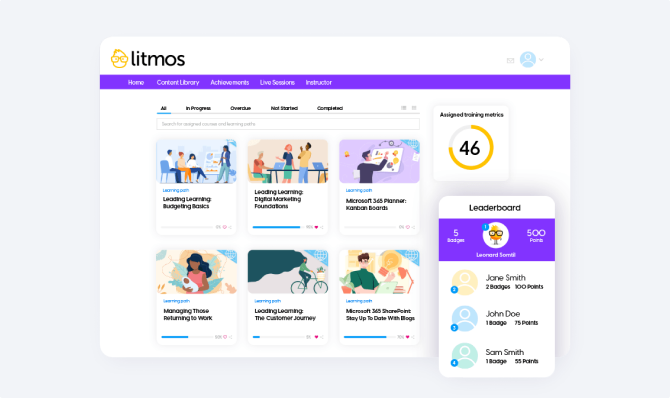
Key features
- A suite of course building tools
- Gamification
- The Litmos Heroes content library
- Social learning features
- A comprehensive list of integrations
- Supports e-commerce
- Strong ILT classroom management capabilities
- Multitenancy
My verdict
If your organization is looking for a Docebo alternative with stronger customization and integration capabilities, Litmos is a good choice. Both Docebo and Litmos offer strong content marketplaces and social learning tools. That said, Litmos beats Docebo by a nose when it comes to e-commerce. It has third-party partnerships with important e-commerce providers like Shopify, allowing you to deploy your courses for free.
Where Litmos falls short is its pricing structure. Many of its best features are only offered in the higher pricing plans, which can be frustrating for companies. It also offers better subscription deals to larger enterprises, meaning it’s probably not the best choice for small and medium-sized businesses. In addition, some users have reported slow response times from the sales support team.
To Sum Up
The eLearning industry is growing quickly, and this is resulting in a lot of new products and platforms. As such, organizations have more LMS options than ever. This allows your company to cherry-pick the best learning platform for your specific needs, budget, and level of expertise. In some cases, it may not end up being the most well-known or popular vendor out there.
I hope this overview of 5 leading Docebo alternatives gives you some food for thought and helps you choose the right product for your organization.







